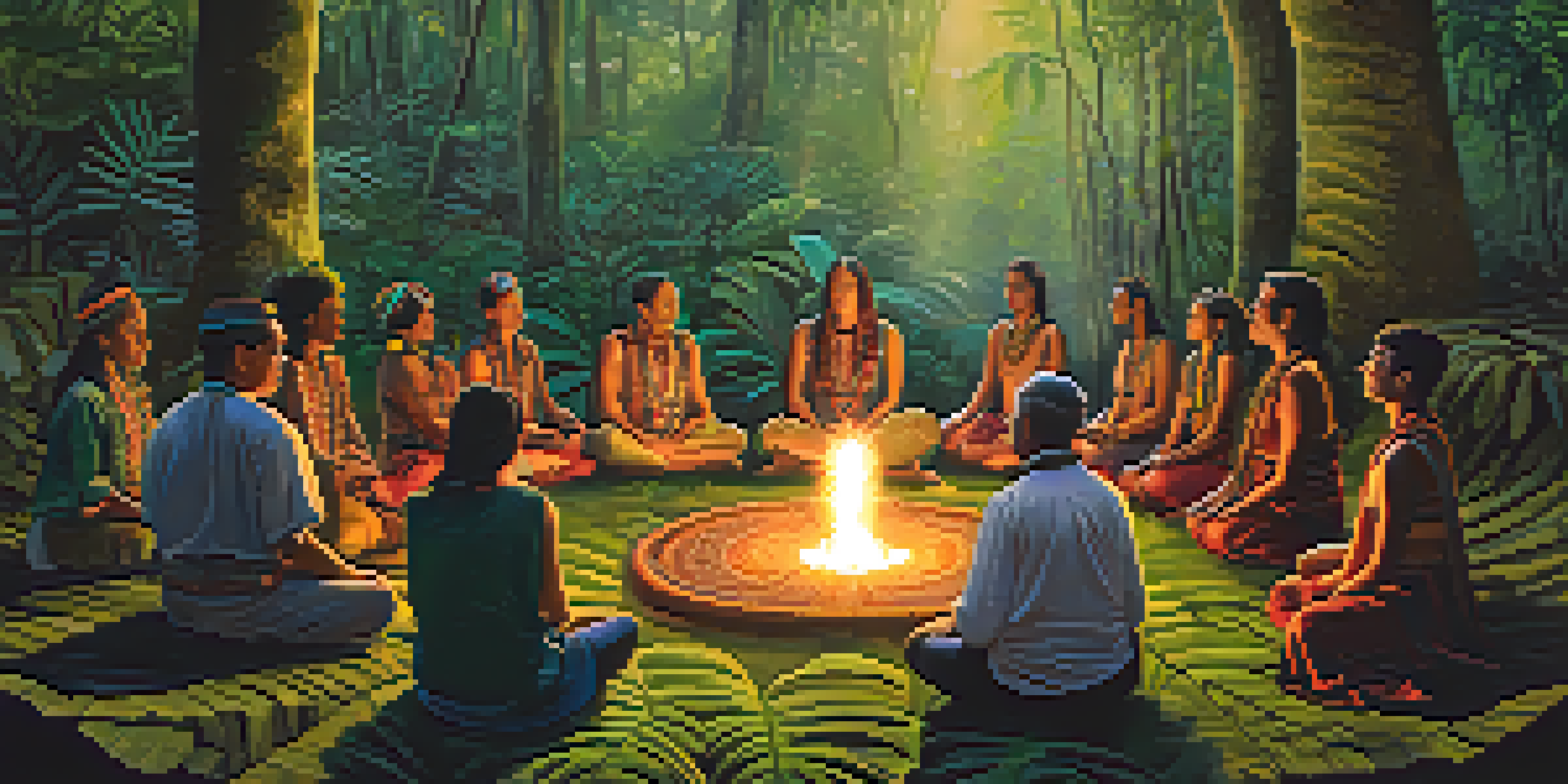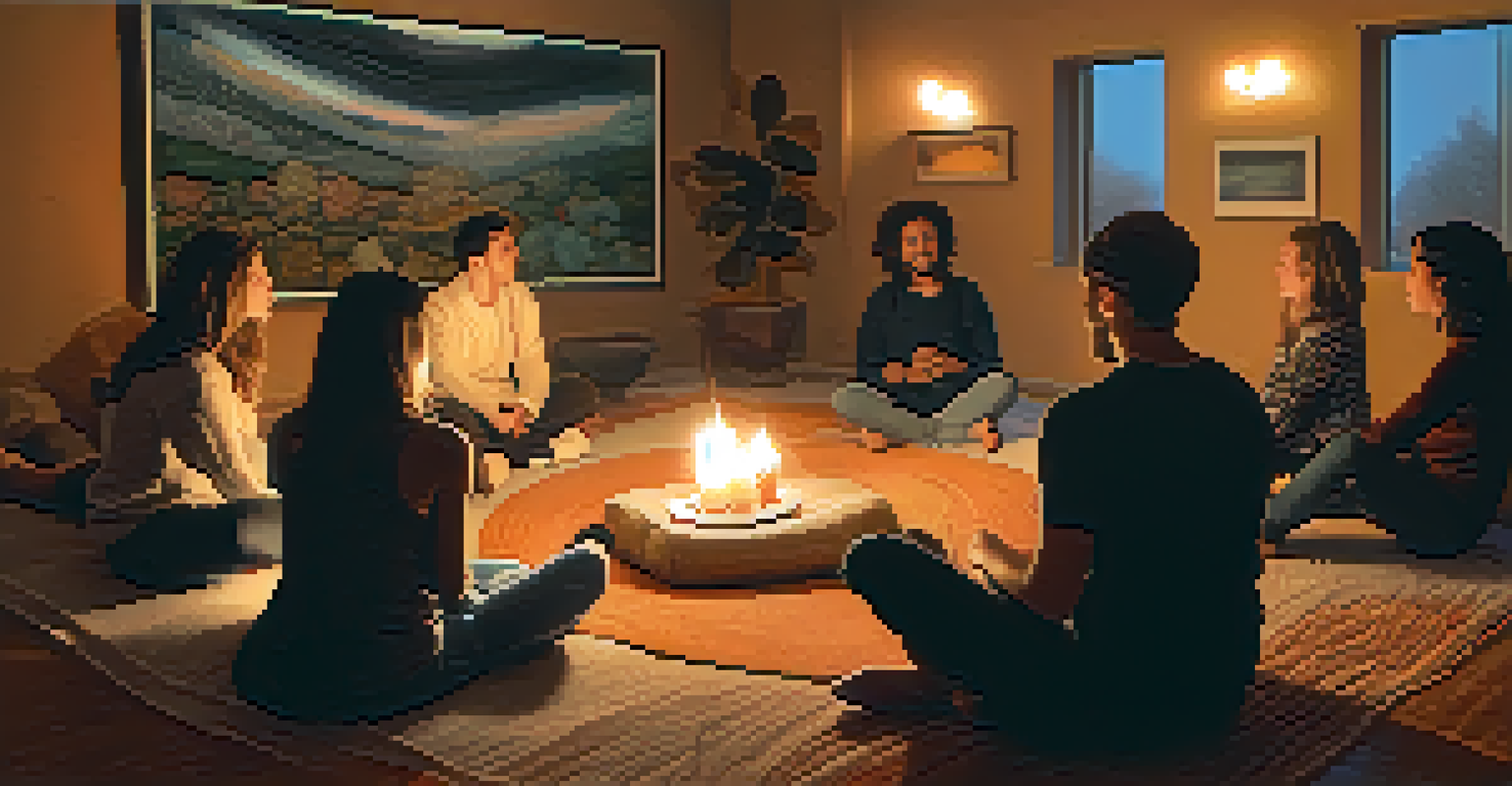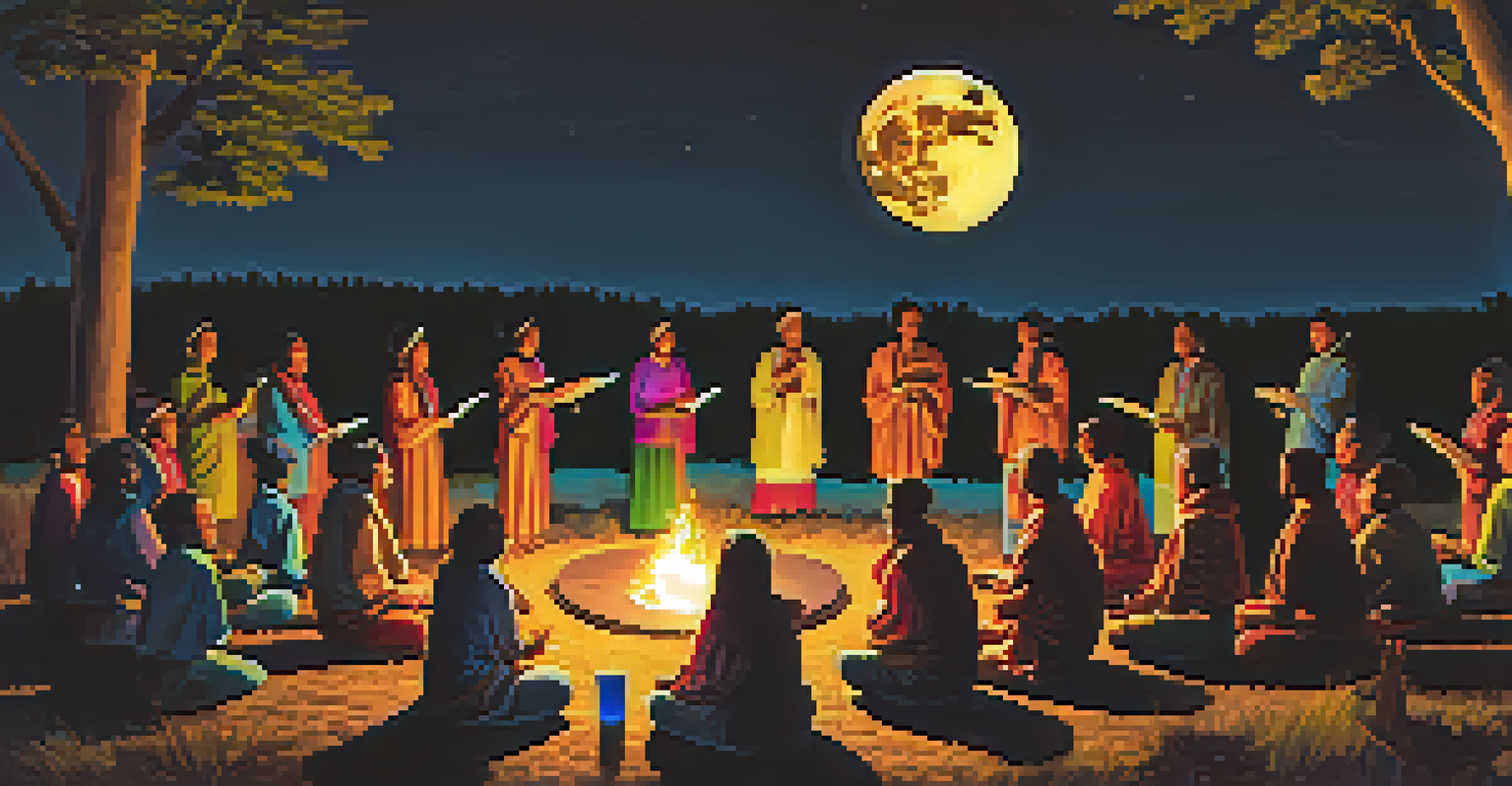Shared Experiences: Community's Role in Entheogen Use

Understanding Entheogens and Their Cultural Significance
Entheogens are substances that have been used for centuries to induce altered states of consciousness, often in spiritual or therapeutic contexts. Many cultures around the world have incorporated these substances into their rituals and traditions, viewing them as sacred tools for connection and insight. The term 'entheogen' itself reflects this spiritual dimension, derived from Greek words meaning 'to generate the divine within.' Understanding this background helps us appreciate the depth of community involvement in entheogen use.
The journey of a thousand miles begins with one step.
In many indigenous cultures, entheogens are not just individual experiences; they are communal events that reinforce social bonds and shared beliefs. For example, in the Amazon, Ayahuasca ceremonies are often conducted by shamans, guiding groups through profound collective experiences. These gatherings emphasize the importance of community in navigating the emotional and spiritual landscapes that entheogens can reveal.
By recognizing the cultural significance of entheogens, we can better understand their role in fostering community connections. This understanding sets the stage for exploring how shared experiences with these substances can enhance personal and collective growth.
The Power of Shared Experiences in Healing
Shared experiences during entheogen use can create a powerful sense of belonging and healing. When individuals partake in these journeys together, they often find comfort in knowing they are not alone in their struggles or insights. This collective approach can amplify the therapeutic effects, making it easier to process emotions and experiences in a supportive environment.

For instance, group therapy sessions that incorporate entheogens have gained attention for their ability to foster deep connections among participants. As individuals share their stories and feelings, they create a safe space where vulnerability is met with compassion. This shared vulnerability can lead to breakthroughs that might be harder to achieve in isolated settings.
Entheogens Foster Community Bonds
Entheogens serve as sacred tools that enhance social connections and shared experiences within communities.
Ultimately, the act of healing becomes a communal journey, where each person's experience contributes to the whole. This interconnectedness not only enhances individual recovery but also strengthens the community as a supportive network.
Rituals and Ceremonies: Strengthening Community Bonds
Rituals and ceremonies play a crucial role in how communities engage with entheogens. These structured gatherings provide a framework for participants to explore their inner worlds while feeling anchored by tradition and shared purpose. Whether it’s a sweat lodge, a full-moon ceremony, or an Ayahuasca retreat, these rituals help to create a sacred space where individuals can connect deeply with themselves and each other.
We are all connected; to each other, biologically. To the earth, chemically. To the rest of the universe, atomically.
Communal rituals often involve elements like music, chanting, or guided meditation, which help synchronize the group’s energy. This synergy can enhance the overall experience, allowing participants to feel more attuned to one another and the shared journey. Over time, these practices can solidify relationships and foster a sense of community identity.
As participants return to these rituals, they build a shared history that strengthens interpersonal bonds. This continuity not only enriches the individual’s experience but also reinforces the community’s cohesion and shared values.
Navigating Challenges Together: Community Support
Engaging with entheogens can sometimes lead to challenging emotional or psychological experiences. In these moments, the support of a community can be invaluable. Having trusted individuals with whom to share these challenges provides a safety net, making it easier to process difficult emotions and insights as they arise.
For example, in psychedelic integration circles, participants discuss their experiences and support one another in making sense of what they encountered. This community-based approach can help individuals feel validated and understood, easing feelings of isolation or confusion that might arise after a profound experience.
Shared Healing Through Vulnerability
Participating in group settings during entheogen use amplifies therapeutic effects and fosters a sense of belonging.
Moreover, addressing challenges collectively can promote resilience within the community. By sharing strategies and insights, members can learn from each other's experiences, ultimately fostering a culture of support and understanding.
Building Trust: The Foundation of Community Experiences
Trust is a vital component of any community, particularly when it comes to engaging in shared entheogenic experiences. Establishing a foundation of trust allows participants to feel safe, open, and vulnerable with one another. This trust is cultivated over time through shared experiences, open communication, and mutual respect.
In many cases, communities that engage in entheogen use will have established norms and guidelines that promote safety and respect. These agreements help participants feel secure in the space, knowing that their experiences and feelings will be honored. As trust deepens, individuals are likely to share more profound insights and emotions, enriching the collective experience.
Ultimately, building trust creates a sense of psychological safety that enhances the overall journey. When individuals feel secure, they are more likely to explore the depths of their consciousness, leading to transformative experiences for the entire community.
The Role of Facilitators in Community Entheogen Use
Facilitators play a crucial role in guiding shared entheogenic experiences within communities. Often trained in therapeutic techniques, these individuals help create a safe and supportive environment for participants. Their expertise can ensure that the experience is both meaningful and safe, helping to navigate any challenges that may arise.
A skilled facilitator can enhance the communal experience by providing structure, guidance, and emotional support. They help to prepare participants for their journey, set intentions, and debrief afterward, processing the experience together. This guidance is essential in maintaining group cohesion and ensuring that everyone feels supported throughout the process.
Trust is Key for Collective Growth
Building trust within communities is essential for creating safe spaces that encourage open sharing and transformative experiences.
Furthermore, facilitators can help bridge the gap between individual and collective experiences. By fostering open communication, they encourage participants to share their insights and feelings, enriching the group dynamic and enhancing the overall experience for everyone involved.
Looking Ahead: The Future of Community and Entheogen Use
As interest in entheogens continues to grow, so does the exploration of their role within communities. There is a burgeoning movement aimed at integrating these substances into therapeutic practices, spiritual exploration, and community-building efforts. This shift reflects a broader societal trend toward recognizing the importance of collective healing and shared experiences.
Emerging research is highlighting the potential benefits of community-based entheogen use, from improved mental health outcomes to enhanced social cohesion. As more individuals and communities engage with these substances, it’s likely that we will see innovative approaches that prioritize connection, trust, and shared growth.

Looking to the future, it’s clear that the role of community in entheogen use will only become more significant. By continuing to foster environments of support, understanding, and shared exploration, communities can unlock the transformative potential of entheogens, paving the way for a more connected and compassionate society.